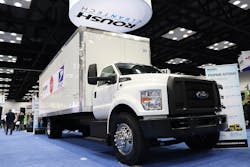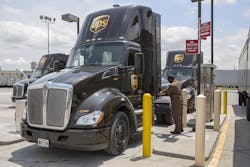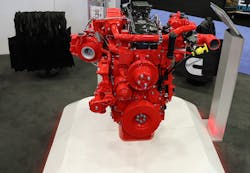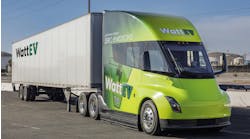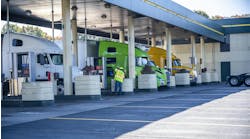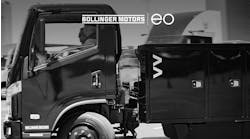Holding off for zero-emission electric vehicles may not always be worth the wait, as trucking fleets of all sizes have found that ‘near-zero’ alternative fuels, including compressed natural gas (CNG), renewable natural gas (RNG), and propane, can provide immediate value to fuel costs and the environment.
Experts representing small, medium, and large fleets spoke about those advantages, along with how to mitigate any disadvantages, during a propane and natural gas opportunities panel at the ACT Virtual Ultra Clean HD Vehicle Summit on Oct. 13. Speakers included Scott Phillippi, senior director of automotive maintenance at UPS; Eric McCann, technical fleet manager at Bimbo Bakeries; and Lisa McAbee, owner of McAbee Trucking, a small contractor for the U.S. Postal Service based in South Carolina.
All three noted that while the sustainability factor is important for their customer-facing fleets, developing a near-zero emission fleet is first and foremost a business case.
“If it doesn't make sense for the business, it's going to be hard to push towards mass deployment, on the backs of subsidies, or technology that really isn't what fits best for the business,” Phillippi said.
Fuel and equipment savings
Bimbo, for example, is realizing $500,000/year in fuel savings by adding 155 CNG, 235 propane, and five electric trucks to its fleet of about 5,600 tractors and route trucks. This was accomplished over the past several years.
It should also be noted the three speakers’ vehicles often cube out before they weigh out, meaning loads are typically lighter. A construction waste hauler might not see the same savings.
The availability of grants, such as through the Volkswagen Diesel Emissions Environmental Mitigation Trust or a clean fleet grant offered by the North Central Texas Council of Governments, can also reduce the initial investment.
“In some cases, you are paying less for an alternative fuel vehicle than you were paying for a fossil fuel vehicle,” McCann said. “And then, on top of that, you are getting exceptional fuel prices.”
July 2020 data from the U.S. Department of Energy found average CNG prices ($2.15/ gasoline gallon equivalent (GGE) were lower than gasoline ($2.22/gal.) and diesel ($2.48/gal.) across the country. New England was the exception, with CNG $0.42/GGE higher than gas. Inversely, the West Coast CNG price was $0.56 lower for CNG than gas and the Rocky Mountain region was $0.44 lower.
McAbee said a grant helped her fleet of less than 50 purchase four new CNG tractors. The postal contractor that runs routes less than 120 miles bought two used CNG trucks in 2017. The fleet also added six Ford-F-750 propane Autogas trucks (Ford 6.8-liter V10 engines and Roush CleanTech propane fuel systems), with assistance from RoushTech and the Propane Education & Research Council.
For McAbee, who said her own asthma along with concerns for future generations inspired her to join the clean air movement, propane makes more sense for her fleet’s duty cycles and the Carolina region.
“We didn't need grants to purchase those trucks because the cost of propane versus CNG box trucks is a 40% difference,” she said. “You can install your own infrastructure, so you do not have to worry about fueling elsewhere. And you can negotiate your price on your fuel with the person who installs your infrastructure.”
McAbee Trucking plans on completely transforming to a near-zero fleet by 2022 and will investigate electrification down the road.
The case for sustainability
Sustainability has become a larger part of the equation as more consumers are concerned with climate change and companies want to show they are part of the solution.
“When consumers look down the road, and you're driving a near-zero or zero-emissions engine in their town, then they know you're trying to help their town,” McCann said.
The larger the fleet, the more impact it can have — and according to Phillippi, should have — by shrinking its carbon footprint.
“We're big,” Phillippi said of UPS (No. 1 on the FleetOwner 500 List of For-Hire fleets). “We have a big impact in the environment, which aligns to what our responsibility should be to try to help push solutions farther and try to push the scalability of what we're trying to accomplish.”
UPS has been a prime mover in the alt-fuels space for decades, with a “show-don’t-tell” approach through its Rolling Laboratory fleet of 11,000 alt-fuel vehicles. The total fleet comprises more than 125,000 vehicles. UPS currently deploys more than 6,300 CNG trucks and about 1,200 liquefied natural gas vehicles, which accrue 8 million miles per week, Philippi said. UPS also has nearly 2,500 propane vehicles and a total of more than 1,000 battery-electric and hybrid-electric vehicles.
UPS is in the midst of receiving an order of 6,000 CNG trucks from Agility Fuel Systems and has an order for 10,000 EVs from Arrival. UPS has vowed to “source 40% of ground fuel from low carbon or alternative fuels by 2025” and increase its Rolling Laboratory by making alt-fuel a quarter of new vehicle purchases by 2020.
Modern CNG/LNG engines can also run on biomethane, otherwise known as renewable natural gas, which recycles “fugitive methane” derived from landfills and dairies that would escape into the atmosphere.
“Renewable natural gas is a great argument of what a well-to-wheel solution could do for the environment,” Phillippi said, adding the caveat that companies must allocate dedicated personnel to an RNG strategy.
“It is definitely a benefit for the fleet, it's a huge benefit for the environment, and it doesn't get the credit it deserves,” he said. “I think some of that just has to do with messaging.”
Maintenance concerns
The overall support network for alternative fuels is smaller than that of gasoline and diesel, so fleets must factor that in along with the lower capital expenditure and fuel savings.
The lack of suppliers and maintenance has prevented Bimbo from investing more into CNG.
“We just don't have the infrastructure in place right now that really supports our vehicles in terms of CNG,” McCann said. “We see it growing, just right now, we're having a little bit of an issue there.”
He said the plan is to focus on a propane, or LPG, fleet.
“There have been maintenance and manufacturing issues, there have been reliability issues, but overall, we can say that natural gas fleet has worked really well for UPS,” Philippi said. “The fact that we don't have to deal with an after-treatment system makes it awfully nice.”
Both Philippi and McCann said maintenance costs of diesel versus CNG were negligible, with sparkplug replacement and valve adjustments equivalent to servicing the aftertreatment system.
“As it pertains to sparkplug, if you start losing one, things can go haywire really quick, so I think it's important to keep your maintenance system up,” McCann said.
There is a maintenance routine learning curve and a fleet can become its “own worst enemy” by not following it to unlock the optimal reliability and fuel savings benefits, Phillippi said.
McAbee said her fleets’ routes of 120 miles hindered the diesel aftertreatment systems in the trucks to complete proper regeneration cycles, where the captured particulate matter is burned off. That caused frequent breakdowns, putting the trucks out of commission, with the double whammy of repair costs.
“We've spent a lot of money on the regen systems and I really believe that with the propane there, we're saving money—not just with the maintenance but with the repairs,” she explained.
Another advantage of propane is that the infrastructure can consist of a freestanding tank. A 2,000-gallon tank may cost $45,000, she said.
McCann also acknowledged Bimbo’s local delivery trucks have issues with getting the DPFs up to the proper temperature, but it’s too early to make any claims about maintenance savings.
“We're not seeing the maintenance benefit over gasoline, not because it's not there, we have some hurdles that we have to overcome with our own OEs,” he said. “They don't always want to hear that you can stretch your oil changes out to 15,000 miles. They just don't have that data necessarily. Now we can prove it with oil samples and things like that. But we're going to have to get our OEs more on board when we're using cleaner fuels such as CNG and propane to be able to see that benefit.”
By removing internal combustion engines altogether, electric vehicles are expected to need much less maintenance (though more data is needed to prove this out), but UPS’ aggressive sustainability goals can’t be met with expectations or projections. They want to act now, not when their various partners and suppliers are ready to implement a bullet-proof electrification strategy.
“If we wait for perfect to show up, it's probably never going to happen,” Phillippi said. “We have an urgency and a need to do something.”
Next-gen reliability
That urgency to act now, spurred by public demand and increasing Environmental Protection Agency regulations, has been accommodated by equipment manufacturers pushing out better engines.
“The technology has definitely increased, and it's become a more reliable vehicle,” McCann said of current CNG engines. They are also quieter and don’t “smell as bad” as conventional fossil fuel trucks, he noted.
Part of the reason is that OEMs such as Cummins Westport, which offers the ISX12N natural gas engine, have become more proficient while meeting the Environmental Protection Agency's (EPA) Optional Low NOx emissions standard of 0.02 g/bhp-hr. Next year, Cummins will release next-generation B6.7 and L9 engines that satisfy EPA 2021 GHG Phase II Emissions Requirements and reduce maintenance intervals by up to four times current models. Reduced frictional loss on the LP will improve fuel efficiency by 5%, according to Cummins Westport. These engines can also run on RNG.
Whatever the near-zero or zero-emission strategy a fleet may want to employ, McAbee said the best advice she can give is: “Just keep moving forward.”
Phillippi took a pragmatic view, as the viability of EVs and fuel cell electric—and all the efficiency-enhancing features such as regenerative braking—in the near term can make them worth a short wait to the right fleets.
“It's about setting yourself up for the future, and not having to buy a new fleet every five years,” he said. “Just make one that's more adaptable to take on a new technology.”
For now, UPS is fine riding on whatever bandwagon gets the job done for the least cost to the business and environment.
“We've got options with natural gas, and I think we're going to leverage that as long as we can until something better comes along,” Phillippi said. “If we waited for electric trucks to show up, we'd still be waiting. We wouldn't be running 8 million miles a week on the natural gas trucks that we have.”

